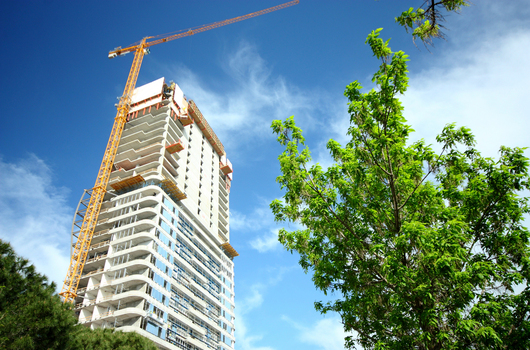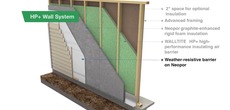Net-zero green builders unite under big goal

The World Green Building Council (WorldGBC) has unveiled a new project to help decrease global greenhouse gas emissions. WorldGBC CEO Terri Wills made the announcement at the Business and Climate Summit in London earlier this summer. The project, Advanced Net Zero, is a partnership between WGBC and Architecture 2030, an American non-profit. The goal is for all buildings to produce net zero carbon emissions by 2050.
The project plans to utilize Green Building Councils, or GBCs, to launch national net-zero certification programs in eight countries, as well as training for building and construction professionals in those countries. The eight countries identified as pilot sites include Australia, Brazil, Canada, Germany, India, the Netherlands, South Africa, and Sweden. The United States Environmental Protection Agency (EPA) lists many of these countries—Canada and India, for example—as top carbon dioxide (CO2) emitters worldwide.
This will be a long and challenging road but together with the dedication and expertise of our Green Building Councils and partners, we can create a thriving market for highly efficient buildings and make net zero the new normal.”
Carbon dioxide is the principal greenhouse gas emission spawned from human activities. It accounts for 65 per cent of all global greenhouse gas emissions, according to the Intergovernmental Panel on Climate Change. Meeting the net-zero goal for 2050 would mean a reduction by 84 gigatonnes of CO2 emissions.
Essentially, the reduction is equivalent to not building 22,000 coal-fired power plants, according to the WorldGBC. “This will be a long and challenging road but together with the dedication and expertise of our Green Building Councils and partners, we can create a thriving market for highly efficient buildings and make net zero the new normal,” says Wills.
Zero certification, zero goals
Net-zero certification indicates that a building is able to produce clean and renewable energy to meet all of its needs, such as heating, cooling, and lighting. According to Advancing Net Zero, all new buildings should be constructed at net-zero standards starting in 2030. Two decades later, 100 percent of buildings should be certified net zero. Therefore, all buildings should be net-zero certified by 2050. This includes buildings that are under construction, as well as buildings that are already built. This will help to address the issues of global warming, which is caused by the increase in heat in the atmosphere that comes from greenhouse gas emissions.
Net-zero training and the big commitment
There are two ways the net-zero certification may be applied. It can be a separate program that operates independently, or it can be added to an existing certification program. The U.S.-based non-profit Architecture 2030, along with country-specific GBCs, will create training to help professionals in each country design and build net zero buildings. By 2030, the hope is that 75,000 professionals across the world will be trained in green building. By 2050, that number is expected to be 300,000. A net-zero certification tool will also be developed and attributed to GBCs that implement the necessary procedures.
The WorldGBC, its 74 Green Building Councils, and the 27,000 company members have made a big commitment. It is, however, a necessity for reducing global carbon emissions. According to the Sustainable Buildings and Climate Initiative of the United Nations Environment Programme, buildings emit roughly one-third of global greenhouse gas emissions, and approximately 40 per cent of all global energy used comes from buildings.
“Getting down to zero won’t be easy,” says Wills. “This will be a long and challenging road but together with the dedication and expertise of our Green Building Councils and partners, we can create a thriving market for highly efficient buildings and make net zero the new normal.”












